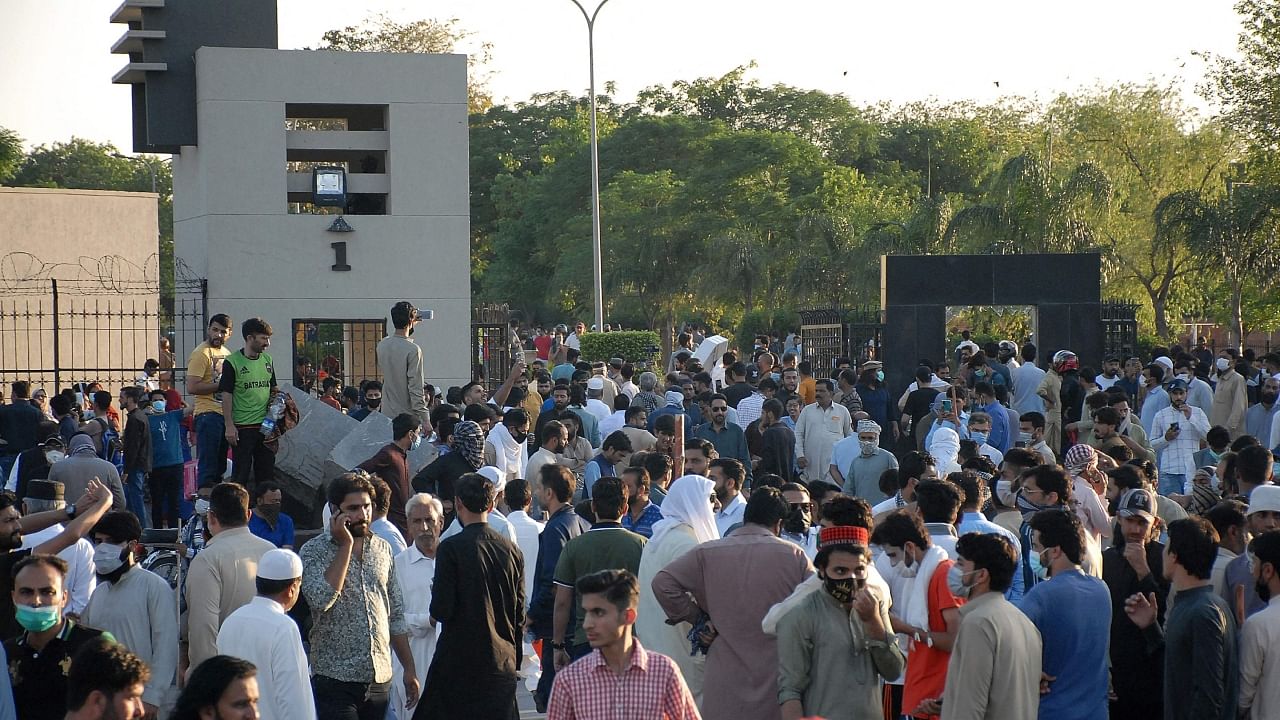
Pakistan's cabinet endorsed the decision by the top security body of the country to hold trials by military courts of those involved in attacks on key army installations.
Protestors took to the streets on May 9 after the arrest of former prime minister and Pakistan Tehreek-e-Insaf (PTI) party chairman Imran Khan and torched military and civilian buildings and vehicles.
The violence left 10 persons dead and thousands injured.
Thousands of supporters of Khan, 70, were arrested in the violence that Pakistan’s Army described as a “dark day” in the history of the Islamic country.
The National Security Committee (NSC) in a meeting on Wednesday agreed that the protesters who ransacked and vandalised military installations would be tried under the Army Act and the Official Secrets Act.
The Express Tribune newspaper reported on Saturday that the cabinet meeting, chaired by Prime Minister Shehbaz Sharif at the Prime Minister House (PMO), gave approval for trying civilians in the military courts just days after the NSC and the Corps Commanders' Conference vowed to bring those behind the violent protests to justice.
On May 9, widespread protests broke out after paramilitary Rangers arrested cricketer-turned-politician Khan from the premises of the Islamabad High Court (IHC). Khan has a massive following across Pakistan.
Also Read | Pakistan: Kaptaan vs Khaki
The protestors vandalised public and state properties and even attacked the General Headquarters in Rawalpindi and Lahore Corps Commander’s residence.
The violence was followed by a crackdown against the PTI leaders and workers.
A cabinet minister while requesting anonymity told The Express Tribune that no new military courts would be established, saying the accused would be tried in the “special standing courts” that are already working under the military act.
However, renowned lawyer and expert on military-related cases, Colonel (retd) Inamur Rahiem, said the defence ministry or the chief of army staff (COAS) will have to formally issue a notification for establishing or reviving the special standing courts.
“Federal government has already empowered the army chief to constitute or even issue a warrant to any formation commander to constitute special standing courts,” Rahiem said, adding that the military usually establishes courts in the units concerned for any crime committed in that particular unit.
Once the special standing courts are established, he said, they can work throughout the year in one city or in different cities.
Previously, he recalled that the special standing courts were set up in Karachi’s Malir area in 2005-2006 due to the law and order situation in the restive city.
However, he added, they stopped functioning when the Supreme Court (SC) later ruled in the Shiekh Liaquat case that there was no need for the military courts as a judicial system was already working in the country.
Nonetheless, he recalled, the high courts had later upheld 98 per cent of convictions of the military court cases when the decisions were challenged.
“The federal cabinet approved the decisions taken in the National Security Committee meeting held on May 16,” the official statement read.
Apart from giving approval for trials in military courts, the NSC had stressed the need for a political dialogue over confrontation to resolve differences.
Before that, in the Corps Commanders' Conference, COAS Gen Asim Munir had decided that perpetrators, planners and executors of such attacks would be tried under Army and Official Secret Acts.
On Friday, the federal cabinet ratified the NSC decisions, according to Express Tribune.